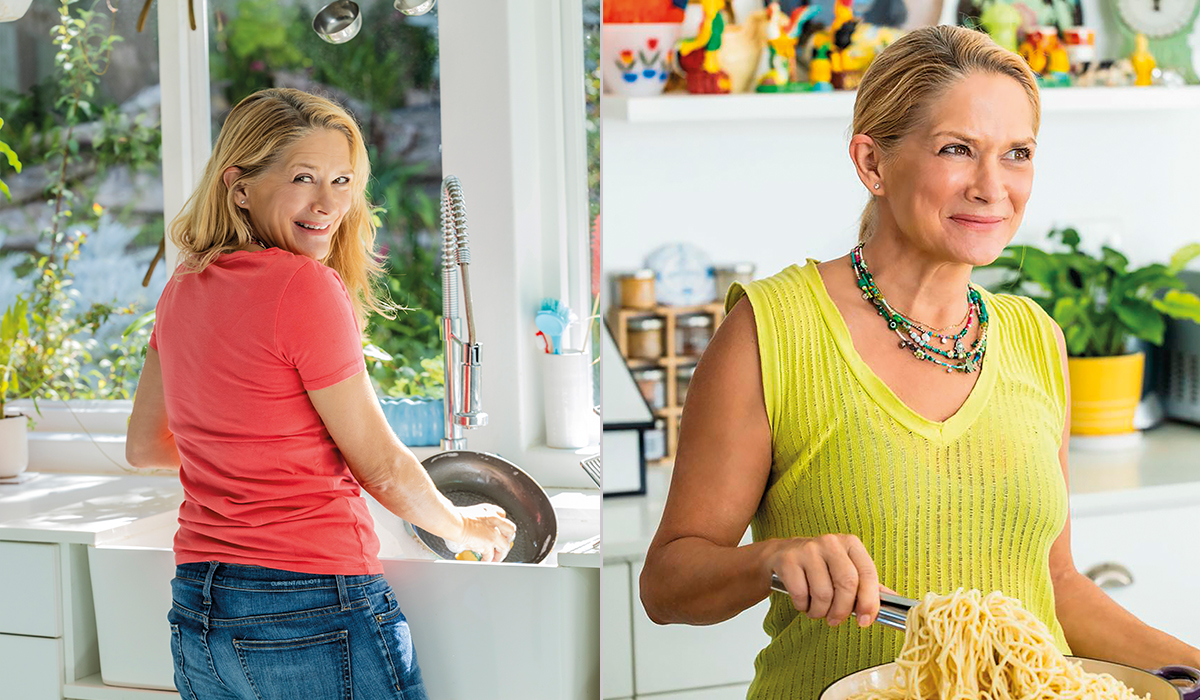We sit down with celebrated lifestyle editor, beloved Masterchef SA judge and cookbook author Justine Drake for a candid conversation about why it’s never too late to rewrite your story.
In an era obsessed with hustle culture and status, Justine Drake’s story is an inspiring antidote, reminding us that a successful career is not a ladder to climb but a landscape to explore. With heart, humour, and hard-earned wisdom, Justine offers a new roadmap. While many professionals aim to reach a singular pinnacle of success, Justine approaches her career as an opportunity to reach new heights, each success meaningful in its own right. “I didn’t really have a plan,” she admits.
“Success in whatever I was doing was vital.” Her career began behind the reception desk at Fair Lady Magazine, where her talent and curiosity soon led to a position as co-food editor —an early glimpse into her passion for food storytelling that would later define her career path. At just 23, she published her first cookbook and from there the milestones kept stacking up. From launching Fresh Living Magazine and working in TV to winning global content awards and occupying executive roles — each step wasn’t part of a grand master plan but guided by interest, instinct and impact.

Peaks and valleys
After reaching certain career goals and success, the usual fantasy is to slow down or release the tight reigns in one’s career, but Justine had something else tugging at her mind and soul. Despite years of recognition and experience, something had shifted. The corporate rat race was no longer lighting a fire within her — instead, it caused exhaustion, frustration and a faltering health. These are the red flags that cannot be ignored. “Frustration turns to irritation. Irritation turns to anger. And anger is just a negative thing,” she shares. The glossy surface of peak career success can often conceal the warning signs of physical and emotional exhaustion. It’s a reminder that unchecked ambition, without care for one’s health or joy, can be corrosive.
For Justine, a career pivot meant walking away from an executive role and years of prestige to start again, going freelance. Why? Because she had finally stopped to smell the roses and ask herself the hardest question of all: Am I still happy? “Leaving, actually, in a way, was a peak,” she reflects. In her eyes, a career is less about reaching one mountaintop and more about recognising the value of the many peaks you encounter along the way. Making the conscious shift towards pursuing a new direction that aligns better with your evolving interests and goals may be a necessary change of scenery.
Leap with purpose
Career changes seem glamorous when viewed in hindsight. Justine insists that pivoting, especially later in life, must be done with careful intent and mindful preparation. “You need a lot of courage, but also really know why you’re doing it,” she says. Like most big decisions in life, a career pivot requires bold intention. In this economy, we know that making a change has serious consequences — this is why a career pivot should serve you emotionally, physically and financially. A career pivot is not an escape; it should be a strategy. While taking a leap is brave, leaping without a plan is reckless. Justine’s advice? Lead with your heart and your head.
View this post on Instagram
Reflection and renewal
After years of chasing deadlines, titles and targets, it’s easy to forget the reason why you started. Somewhere between all the haste, your vision may have blurred into someone else’s and not your own. That’s why Justine champions self-reflection as a necessary act of professional upkeep. You’ve got to ask yourself the tough questions. “The hard work is looking at you and answering you,” she says. Checking in with yourself regularly is not just healthy, it’s necessary. For many of us, fear holds us back and keeps us stuck but self-reflection is a vulnerable yet powerful practice that allows us to gain perspective on our overall life and career. If you can’t confront yourself alone, don’t retreat. Seek support through guidance from a mentor or a life coach that can assist in making sense of difficult cross-paths. Reflection doesn’t mean you’ve failed. It means you care enough about your future to take time and plan for it.
Check in, don’t check out
Ask yourself:
Are you constantly exhausted, not just physically but emotionally?
Has your work become a source of irritation rather than inspiration?
Do your weekends feel like recovery instead of rejuvenation?
Is your health and sense of joy taking the backseat?
Make or break
A career pivot means changes upon the horizon so it’s crucial to ensure that the new path you’re leading is one that fuels you. What keeps the love for your profession burning? For Justine, it’s about taking breaks, setting challenges and checking in with yourself. “It’s like keeping the love alive in the relationship you have with yourself and your career,” she says. Breaks can help you identify where you’re at emotionally and physically.
Taking worthwhile breaks from your work is not only about getting the rest that you need but it’s also about finding inspiration. Your work life and ambition are destined to blossom when you have the chance to take time off, go away for the weekend or just make time for your hobbies. Moreover, creating challenges in your career is what give you direction — it’s a compass to generate your passion and grow new skill sets. Pivoting is a career challenge in itself, but having specific goals within larger aspirations is what keeps you going.
As Justine said, checking in with yourself constantly is all about making sure you’re happy and if not, it’s about changing the things you can change, solving the problems that have answers and allowing yourself to be vulnerable. These are non-negotiables when making a pivot because work and life aren’t separate, despite what some may say. To sustain creativity and motivation, both must be nurtured. Whether it’s a weekend away, a cooking class, or a new goal – these small resets can breathe life back into your professional spirit. A pivot is a creative act that says: ‘I’m still evolving’.
@_picknpayCooking with wine just makes food taste better! 🍷 Learn the basics and benefits of cooking with wine from MasterChef judge, Justine Drake. #PnPxMasterChef #PnP #FoodandWine♬ Instrumental – Vibe – pedrin cria
Wisdom for the wavering
To those who feel stuck, scared or stuck in fear, Justine’s final take is to not do it alone. Changing your life isn’t about sudden epiphanies. Ask the right questions. Sit with those answers and build from that. Change is about sustained inquiry, emotional courage and strategic action. “Know yourself,” she says, “then you can do anything.” Let this be a reminder that it’s never too late to pivot. Don’t do it because you’re lost and angry, do it because you are seeking a new direction.
A late-career change doesn’t have to mean drama or risk, just clarity.
Know your why.
Don’t leave because you’re mad. Leave because you’re ready. Pivot with purpose.
Check in, honestly.
Make two lists: what you like and don’t like about your work and life. Let those answers guide you.
Make a plan.
Have a financial buffer. Talk to your bank. Work with a coach. Don’t just quit on impulse.
Lean into joy.
Whether it’s food, teaching, beauty, coaching or consulting. Aspiring to your new path should reconnect you to joy.
Stay brave. Fear is normal.
If you’re not at least a little scared, you’re probably not challenging yourself enough.
By: Claudia Da Silva
Photography by: Zhann Solomons, Pexels
Text courtesy of Balanced Life magazine
Also read: Kim Jayde is back & bolder than ever







